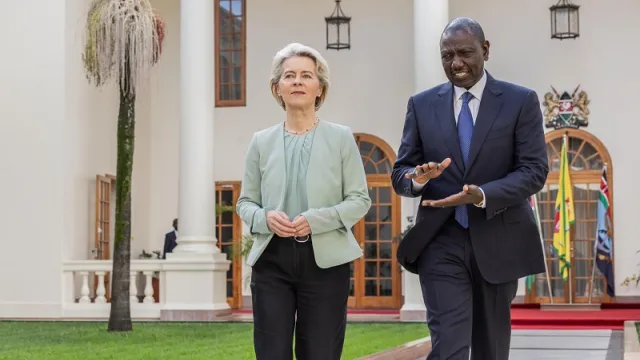Kenya moves closer to gaining duty-free access to EU markets

Kenya moves closer to gaining duty-free access to EU markets
Kenya aims for duty-free access to its exports in the European market following the signing of the Economic Partnership Agreement (EPA) at State House, Nairobi. The pact aims to boost bilateral trade in goods, increase investment flows, and contribute to sustainable economic growth.
According to the 27-member European trading bloc, the EPA provides a platform to support job creation on both sides, along with targeted cooperation to enhance growth in East Africa's largest economy.
"The deal, the first with a developing country in which the EU's new approach to trade and sustainable development is reflected, will further spur EU investment in Kenya, guaranteeing higher earnings for our products," noted President William Ruto.
It is the most ambitious trade deal ever signed by the EU with a developing country, particularly in terms of sustainability provisions such as climate and environmental protection, labor rights, and gender equality, the EU stated. This agreement opens the mega, lucrative, and premium EU market for Kenyan products, creating and expanding opportunities for our businesses and exporters, added Dr Ruto.
Pact awaits ratification
The agreement, which has been under negotiation for seven months, will now be presented to the parliaments of both sides for ratification before it comes into force.
President of the European Commission, Ursula von der Leyen, noted that the EPA was a "win-win situation on both sides" and called for other East African nations to join the pact. "We are deepening trade ties and building up our economic resilience. We are opening a new chapter in our very strong relationship, and now our effort should be focused on implementation."
At the moment, the EU is Kenya's first export destination and second-largest trading partner after the US. Available data shows Kenya-EU trade totaled Kes552 billion (€3.3 billion) last year, an increase of 27 per cent compared to 2018.
Policymakers expect that the EPA will create even more opportunities for Kenyan businesses and exporters, as it will fully open the EU market for Kenyan products upon entry into force. What's more, it will also incentivize EU investment in Kenya, thanks to increased legal certainty and stability.
The EU said the EPA takes into account Kenya's development needs by providing a longer period to gradually open its market. It also includes a special safeguard for agriculture, food security, and infant industry.
Read also: Govt will buy only 2 percent of maize from target farmers at Kes4,000
Supporting local farmers
A dedicated chapter has been included on economic and development cooperation, aimed at enhancing the competitiveness of the Kenyan economy. Together with EU development assistance, this will help build capacity and assist Kenya in implementing the EPA smoothly while supporting local farmers in meeting EU standards and in reaping the opportunities this agreement provides, the EU said in a statement.
"This agreement will also contribute to sustainable and fair economic growth, bringing new opportunities for companies, to the benefit of both our people. It includes the strongest social and climate commitments of any EU trade deal with an African country,” said von der Leyen.
The Economic Partnership Agreement between the EU and Kenya aims to implement the provisions contained in the EU-East African Community (EAC) EPA and will be open for other EAC countries to join in the future.



